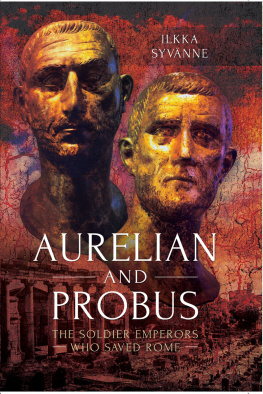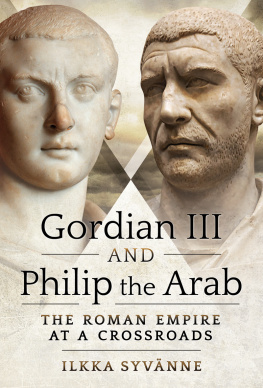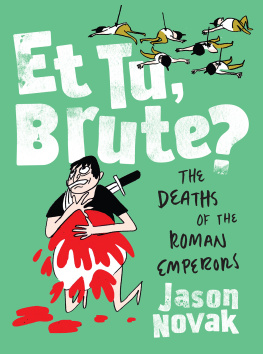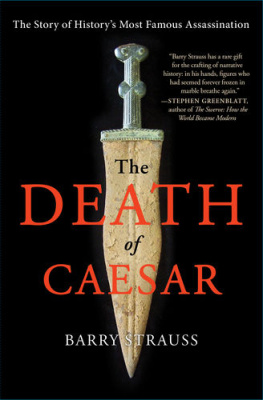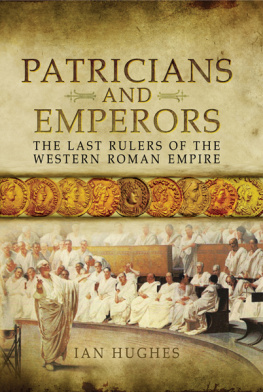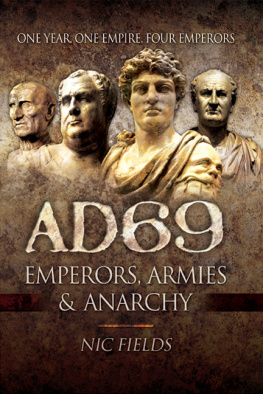All the virtues of all men are as great as they have been made to appear by the genius of those who related their deeds
Flavius Vopiscus Syracusii, Historia Augusta, Probus 1.1 tr. by Magie, 335
Aurelian was not unlike Alexander the Great or Caesar the Dictator; for in the space of three years he retook the Roman world from invaders
Pseudo-Victor, Epitome De Caesaribus 35.1, tr. by Banchich at www.roman-emperors.org
Probus, an emperor whose rule restored to perfect safety the east, the west, the south, and the north, indeed all parts of the world, is now, by reason of a lack of writers, almost unknown to us
Flavius Vopiscus Syracusii, in Historia Augusta, Probus 1.3 tr. by Magie, 337
For my wife Sini, and children Ari and Nanna for their patience .
Dr. Ilkka Syvnne

Aurelian;Probus Photos by author (British Museum).
First published in Great Britain in 2020 by
Pen & Sword Military
An imprint of
Pen & Sword Books Ltd
Yorkshire Philadelphia
Copyright Dr. Ilkka Syvnne 2020
ISBN 978 1 52676 750 9
eISBN 978 1 52676 751 6
Mobi ISBN 978 1 52676 752 3
The right of Dr. Ilkka Syvnne to be identified as Author of this work has been asserted by him in accordance with the Copyright, Designs and Patents Act 1988.
A CIP catalogue record for this book is available from the British Library.
All rights reserved. No part of this book may be reproduced or transmitted in any form or by any means, electronic or mechanical including photocopying, recording or by any information storage and retrieval system, without permission from the Publisher in writing.
Pen & Sword Books Limited incorporates the imprints of Atlas, Archaeology, Aviation, Discovery, Family History, Fiction, History, Maritime, Military, Military Classics, Politics, Select, Transport,
True Crime, Air World, Frontline Publishing, Leo Cooper, Remember When, Seaforth Publishing, The Praetorian Press, Wharncliffe Local History, Wharncliffe Transport, Wharncliffe True Crime and White Owl.
For a complete list of Pen & Sword titles please contact
PEN & SWORD BOOKS LIMITED
47 Church Street, Barnsley, South Yorkshire, S70 2AS, England
E-mail:
Website: www.pen-and-sword.co.uk
Or
PEN AND SWORD BOOKS
1950 Lawrence Rd, Havertown, PA 19083, USA
E-mail:
Website: www.penandswordbooks.com
Acknowledgements
I d like to thank the Commissioning Editor Phil Sidnell and Matt Jones, Barnaby Blacker and other persons for their stellar work. Big thanks is also owed to family and friends for reasons they know well.
List of Plates
Coin of Gallienus.
Coin of Claudius.
Coin of Quintillus.
Two coins of Aurelian.
Coin of Tacitus.
Coin of Florianus.
Coin of Probus.
Coin of Carus.
Nineteenth century photos of the siege of Verona in 312 in the Arch of Constantine.
The Battle of the Milvian Bridge in 312 in the Arch of Constantine.
Coins of Aurelian.
Coin of Probus.
Coin of Carus.
Coin of Diocletian.
Bust of Claudius or Aurelian.
Busts of Probus?
A typical Germanic horseman.
A typical Germanic footman.
A Roman auxiliary soldier of Germanic origins.
Six coins of Aurelian.
Germanic clubmen attack Palmyrene cataphracts at the battle of Emesa in about May 272.
An unidentified person in the collection of the British Museum, maybe the emperor Carus.
Authors drawing of a Palmyrene horseman after a mosaic.
Praetorian cavalry performing feigned flight.
Palmyrene mounted archer after a mosaic.
Duel between Probus and Aradio in AD 269 and two coins.
Cataphract armed for both long and close distance combat.
Bust usually identified as Probus, but could be Claudius.
An unknown late third century emperor at the Metropolitan Museum.
Three Palmyrene gods in lamellar armour (first century AD ).
A heavily equipped Roman front-rank fighter.
Two Roman horsemen of Dalmatian origins at the battle of Immae in 272.
Aurelian with his retinue at the Battle of Emesa in about May-June 272.
A Roman cavalry officer leading a cavalry attack.
One of the presumed busts of Claudius II at Brescia.
Authors drawing of Aurelian with aegis and bloody sword together with his coin.
Probus.
A legionary armed for combat against infantry.
The two presumed busts of Claudius II at Brescia.
Authors drawing of Carus meeting Persian ambassadors in Armenia in 282. The narrative caption for this image is as follows: Come here! You have come to see me. I am Carus. Tell your young king that unless he acted wisely, he should expect that the whole of your forest and plain would be barer than my head within a single month. After this, Carus took off his pileus [ a cap, which is likely to be the pileus Pannonicus, a round fur cap with a round top ], and showed his head. And then, Carus said: If you are hungry eat from the stew-pot with me, but if you are not in need, then leave at once! For the source, see the text. This image shows Carus receiving Persian envoys at the beginning of his Persian campaign in the highlands of Armenia. The man holding four bowls of bean soup strengthened with bits of pork is the comes domesticorum Diocles (the later emperor Diocletian/Diocletianus). I have made here the educated guess that many of the so-called late Roman units were already in existence and had similar names and emblems as two years later, so that Diocles would have already been in command of the Ioviani (the eagle shield emblem) while the men with the horned shield emblems would have belonged to the Cornuti . At this time the Ioviani would have belonged to the corps known collectively with the name protectore s, which served under the comes domesticorum . The man with the crested helmet is taken from the Ludovisi Sarchophagus and represents the praetoriani . Carus had been their commander before the usurpation so it is certain that the members of this corps were always close by. The man with the rectangular curved scutum shield belongs to the urbaniciani . A detachment of these often accompanied the emperors. The rectangular shield has been taken from the Adluctio coins of Probus. The head of Carus has been borrowed from one of his coins. I have also purposefully included among the symbols both the swastika and the Star of David to show that these could be worn simultaneously by the Romans with no problem because they did not have the connotations they have today. The Persians have been modelled after Hattenroth and extant Persian reliefs. The Persian campaign of Carus was among the greatest achievements ever achieved against the Persians and served as a model for Galerius in 2978. It was a huge military success and similarly horrible humiliation for the Persians. Carus pillaged and torched their capital Ctesiphon and Seleucia and was ready to advance deeper into the Persian Empire to deliver the killing blow in a situation in which the Persians were divided and fighting a civil war. It was then that a disaster struck. Carus was killed by a lightning bolt. This has been quite needlessly doubted by modern historians because several Roman sources make an effort to deny its possibility, but this view does not take into account the superstitious disposition of the soldiers of the time. The death by a lightning bolt could be seen as a form of divine punishment for having advanced too deep into Persian territory, and it was this that the Roman sources attempted to hide. It was necessary to maintain that the emperor died of disease or some other cause so that the soldiers and populace would not think that the gods were against the Romans and on the side of Persia. The instance shown here belongs to the category of military stratagems. Carus allowed the Persians to go around the marching camp to demonstrate to them that he had nothing to hide. His army was far superior to that of the Persians. He also wanted to demonstrate his personal toughness and confidence to the envoys with this. The aim was to demoralize the Persians with this sight and it appears to have worked.

